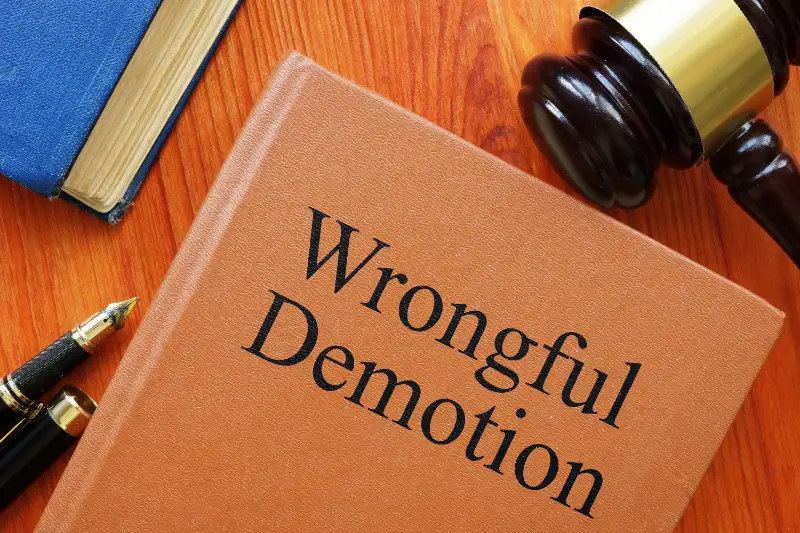
If you have suffered an unfair demotion at work, then a wrongful demotion lawsuit will be your best bet for clearing your name and getting your career back on track.
But before you begin your lawsuit, it’s vital to know how to prove your claims. As Sun Tzu once wrote, “Victorious warriors win first and then go to war.”
There are two primary ways to prove wrongful demotion as a federal employee.
The first is by showing that the government did not have just cause to remove you.
The second way is by proving that your employer demoted you for illegal reasons, like discrimination or retaliation. Read on to learn more about these pathways and their respective legal requirements.
If you have more detailed questions after reading this article, contact one of our outstanding federal employment attorneys.
How to Handle an Unfair Demotion
Handling an unfair demotion is difficult under any circumstances. However, your strategy depends on how far along you are in the disciplinary process.
As a brief reminder, there are three main stages of the disciplinary process:
- Before you receive a proposal letter,
- After you receive a proposal letter, and
- After you receive a decision letter.
1. Responding Before Your Employer Officially Proposes a Demotion
Many employees have no idea that their employer is about to propose their demotion. However, there are other situations where you know that some kind of action is coming.
If you are currently in this situation, make sure you document all interactions with your employer. Save copies of any relevant emails and journal any notable conversations. Continue doing this throughout every part of the disciplinary process.
Furthermore, consider scheduling a meeting with your supervisor or human resources team to discuss the alleged issue and potential alternatives.
Hiring a legal representative for this kind of meeting can be a great way to show your employer that you want to resolve the situation and are willing to stand up for your rights.
With timely action, many disciplinary actions can be delayed or even canceled.
2. Responding at the Proposal Stage
By now, your employer is officially attempting to remove you. Fortunately, the law provides you with several protections.
Due process requires that your employer first give you 30 days advance notice of its intent to demote you. They must do this in writing via a proposal letter.
A proposal must include the following information to meet due process requirements:
- The reason for the proposed demotion (i.e., the “charge”),
- The evidence that supports their actions,
- A reasonable time period to respond to the proposal orally or in writing, and
- Your right to representation.
Make full use of all of these rights. Check whether the proposal letter meets all due process requirements. After that, carefully review the evidence.
Does the proposal include objective evidence or just second-hand eyewitness accounts? Does anything suggest that you are getting treated differently than your colleagues?
Next, hire a legal advisor to help you craft a thorough oral and written reply. This reply may prove vital in convincing the deciding official not to demote you.
3. Responding After the Final Decision Letter
After a minimum of 30 days, your employer will issue a final decision letter. In this letter, the deciding official can either uphold the penalty, mitigate it, or cancel the action entirely.
If you have received a decision letter upholding the unfair demotion, then you have the right to appeal the action to the Merit Systems Protection Board (MSPB).
Appeal your unfair demotion with the board within 30 days of the decision letter date. After that, hire an attorney to discuss how you will argue your case.
Legal Standards at an MSPB Hearing
In an MSPB hearing, the burden is on your employer to justify their actions.
If the demotion was related to misconduct, then your employer must prove by a preponderance of the evidence that you committed the alleged conduct. They must also demonstrate that there is a nexus between your alleged misconduct and the efficiency of the federal service.
If they cannot meet this burden, then the judge will overturn or mitigate your demotion.
Even if the agency meets its burden, you have the opportunity to defend yourself by raising affirmative defenses. There are two main types of affirmative defenses:
- Harmful error. In other words, the agency harmed your rights by not following the appropriate procedures.
- Prohibited personnel practice. If you raise this defense, you must show that the agency acted for certain illegal reasons, like racial discrimination or whistleblower retaliation.
You can also argue that the agency’s decision was not in accordance with the law in some other way.
If you can prove your affirmative defense by a preponderance of the evidence, then you will prevail even if the agency proves you committed the alleged misconduct.
Can There Be Compensation for a Wrongful Demotion?
Yes. If you succeed in your appeal, the MSPB can award you back pay, compensatory damages, and attorney’s fees. It can also reinstate you in your previous position.
Contact Our Federal Employment Attorneys to Help You Handle Your Unfair Demotion
Here at the Federal Employment Law Firm of Aaron D. Wersing, each one of our attorneys has a proven track record of effective litigation on behalf of federal employees.
We’ve tackled all kinds of MSPB appeals, including ones for unfair and improper demotions.
Thanks to our experience, we can work with you to identify an effective litigation strategy that maximizes your chance of a successful appeal.
Along the way, we’ll provide you with sterling client service. Reach out to us today to schedule an initial appointment.

